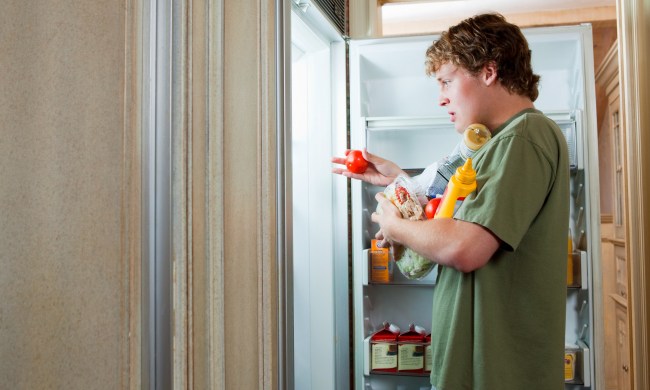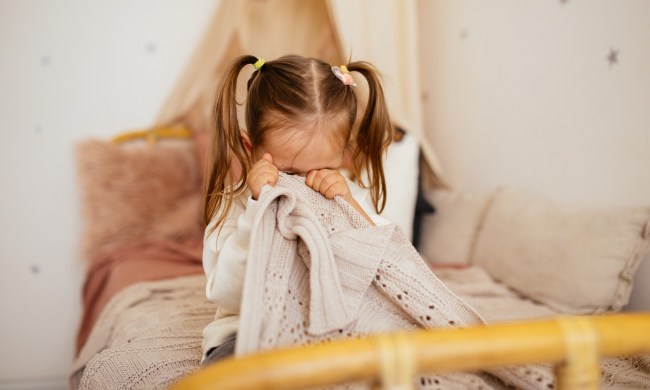This scenario has happened to parents many times, and possibly it’s happened to you.
You’re peacefully going about your errands with your child in tow. He or she takes in all the sights and sounds and even asks a few questions. Then, out of nowhere, the once happy kid bursts into crocodile tears. You have no clue why or what’s happening! Luckily for you, we’ve searched for insight from the experts to give you some reassurance and some tips on how to handle this situation.
Why is my kid crying for no reason?
First off, the reasons your kid is crying depend on his or her age. For babies and young toddlers, overstimulation can bring on tears. Too much visual or auditory stimulation can get overwhelming, so those are two factors to keep in mind.
Another relates to exhaustion. While babies and children around the age of two don’t have the verbal skills to tell you that they’re tired, they still exhibit telltale signs of being worn out before they reach their limit and start crying. Thus, energy level is another consideration to remember when your child starts crying for no apparent reason.
Likewise, children might always tell you if they’re not feeling well. Some start crying or at least whining before they tell you that something hurts or when they feel sick. Therefore, checking for symptoms, like fever, or signs of an illness can help to crack the crying code.
One other possibility relates to being hungry. While you might associate this more with babies and young toddlers, even older children might shed tears if they’re at the point of being “hangry.” Thus, offering a healthy snack and a drink resolves this issue until the next mealtime.
Furthermore, stress, according to Amy Morin, LCSW, can cause an older child to cry and to be easily provoked. For instance, if you notice that your child cries a lot from the time he or she gets home from school or daycare until it’s time to go to another activity like a music lesson or a sports practice, then the transition might be too difficult. Plus, if he or she has to squeeze in homework and a meal before the next activity, then the situation can get rather stressful. While it’s important to help your child learn the skills for dealing with stress and self-calming, you might also consider cutting back on the busy schedule.

What to do when a child keeps crying?
The puzzle behind your child’s crying has many solutions. However, before trying to resolve the issue behind the crying, you might need to conduct some self-inventory. For instance, Dr. Ashanti Woods of Baltimore’s Mercy Medical Center recommends paying close attention to your own emotions and stress level especially if the crying is trying your patience. You might need to step away for a moment by enlisting the help of your partner to keep an eye on your child, or if you’re alone, make sure your child is out of harm’s way and step out of the room to collect your thoughts and calm down. Once you’re ready to assess the situation, you’ll need to pay special attention to your words so that you’re validating your child’s feelings as opposed to trying to squelch them.
From there, the first step you should take is to check if your child is running an elevated temperature or has an injury. If all is well physically, you can ask your child to take a few deep breaths and explain what’s troubling him or her. This part takes time and much patience because your child might not be able to tell you right away. However, if you ask him or her to “help” you to understand so that you can offer assistance or reassurance, then that will deescalate the situation. Also, helping your child to find the words to describe and understand emotions and to be able to cope with them goes a long way toward getting through life’s obstacles.
Finally, providing as much consistency and stability as possible, particularly with the daily routine and schedule, helps to stave off stress and avoid excessive tiredness. And above all, you’ll need to remember that you can’t solve every problem for your child. Perhaps help is needed, or maybe, in the case of older children and teens, your child might need to navigate the issue. Additionally, sometimes your child needs to have a good cry in order to get all of his or her emotions back in balance which is only normal.
Before you know it, this phase will pass and even give way to another type of behavior — like the “silent treatment” — when your child gets older. Regardless of the initial manner of coping, your reaction will be the key to how your child manages challenging moments. Thus, if you stay calm, you’re more likely to diffuse the situation and calm your child down. Another bit of good news is that as your child gets older, you’ll be better able to read the signs and decipher the ”tired” cry from the “feeling ill” cry along with the cry that goes with trying to get your attention. Either way, you’ll be well prepared to bring calm back into your little one’s world.



